

FDA Database: 93% of Food Additives Aren't Properly Studied. If the mandate of the FDA includes protecting public health by assuring the safety of the food supply, why is the organization allowing a staggering amount of additives to adulterate our food?
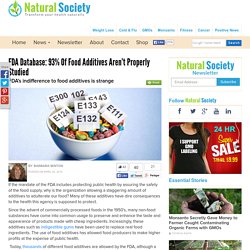
Many of these additives have dire consequences to the health this agency is supposed to protect. Since the advent of commercially processed foods in the 1950’s, many non-food substances have come into common usage to preserve and enhance the taste and appearance of products made with cheap ingredients. Increasingly, these additives such as indigestible gums have been used to replace real food ingredients. The use of food additives has allowed food producers to make higher profits at the expense of public health.
Today, thousands of different food additives are allowed by the FDA, although a 2013 study found that almost 80% of them lack the relevant information needed to estimate the amount that consumers can safely eat. Read: 4 Ways the FDA has Failed Us We can only guess the agenda of the FDA.
Research shows that bee pollen can improve skin, increase fertility and more. (NaturalNews) Bee pollen, also called bee bread, is a small granule of pollen (mixed with other ingredients such as nectar and bee saliva) created by worker bees to help feed the hive.
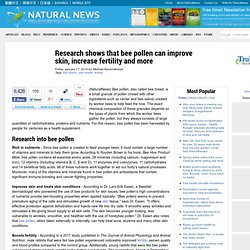
The exact chemical composition of these granules depends on the types of plants from which the worker bees gather the pollen, but they always consists of large quantities of carbohydrates, proteins and nutrients. For this reason, bee pollen has been harvested by people for centuries as a health supplement.Rich in nutrients - Since bee pollen is created to feed younger bees, it must contain a large number of vitamins and minerals to help them grow.
According to Royden Brown in his book, Bee Hive Product Bible, bee pollen contains all essential amino acids, 28 minerals (including calcium, magnesium and iron), 12 vitamins (including vitamins B, C, E and D), 11 enzymes and coenzymes, 11 carbohydrates and 14 beneficial fatty acids. All of these nutrients work together to aid our body's natural processes.
Grass-fed beef is more nutrient dense than poultry. (NaturalNews) For over 60 years red meat has been vilified for its heart clogging saturated fat & cholesterol content.
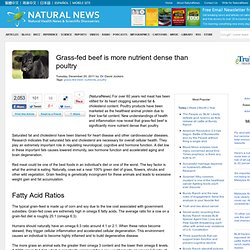
Poultry products have been marketed as the healthiest animal protein due to their low-fat content. New understandings of health and inflammation now reveal that grass-fed beef is significantly more nutrient dense than poultry. Saturated fat and cholesterol have been blamed for heart disease and other cardiovascular diseases. Research indicates that saturated fats and cholesterol are necessary for overall cellular health. They play an extremely important role in regulating neurological, cognitive and hormone function. Red meat could be one of the best foods in an individual's diet or one of the worst. The typical grain-feed is made up of corn and soy due to the low cost associated with government subsidies. Humans should naturally have an omega 6:3 ratio around 4:1 or 2:1. Chicken and turkeys cannot live on grass alone. Sources For This Article About the author:Dr. Banana nutrition facts - nine things you probably never knew about this nutritious tropical food.
Wheatgrass. Research says eating walnuts improves critical thinking. (NaturalNews) Walnuts have long been known to influence the brain and in the natural health world, they're known as a key brain food.
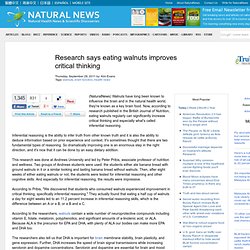
Now, according to research published in the British Journal of Nutrition, eating walnuts regularly can significantly increase critical thinking and especially what's called inferential reasoning. Inferential reasoning is the ability to infer truth from other known truth and it is also the ability to deduce information based on prior experience and context. It's sometimes thought that there are two fundamental types of reasoning. So dramatically improving one is an enormous step in the right direction, and it's nice that it can be done by an easy dietary addition. Flavonoids in fruits, vegetables and nuts dramatically lower cancer rates.
(NaturalNews) Flavonoids and proanthocyanidins are often found in fruits and vegetables, and they are powerful cancer prevention agents.
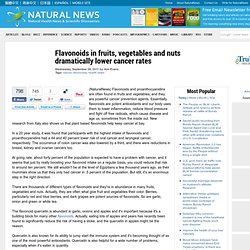
Essentially, flavonoids are potent antioxidants and our body uses them to lower inflammation, reduce blood pressure and fight off free radicals, which cause disease and age us, sometimes from the inside out. New research from Italy also shows us that plant based flavonoids help keep cancer at bay. In a 20 year study, it was found that participants with the highest intake of flavonoids and proanthocyanidins had a 44 and 40 percent lower risk of oral cancer and laryngeal cancer, respectively.
The occurrence of colon cancer was also lowered by a third, and there were reductions in breast, kidney and ovarian cancers too. At going rate, about forty percent of the population is expected to have a problem with cancer, and it seems that just by really boosting your flavonoid intake on a regular basis, you could reduce that risk to around ten percent. Healing Herbs: 7 Herbs and Spices you Should have in your Pantry - StumbleUpon.
Our bodies are complex, sensitive systems that are affected to a greater or lesser extent by a whole hose of external forces—air quality, the clothing we wear, where we live, the diets we eat.

It all has an impact on our health. Even things as small and seemingly inconsequential herbs and spices can really benefit us physically, and we’re not just talking about our taste buds, either. Read on to find out how your eating habits may help to heal you. 1. Garlic Whether you like Asian, Italian, or Latin American cuisine, your love of garlic likely has something to do with it.